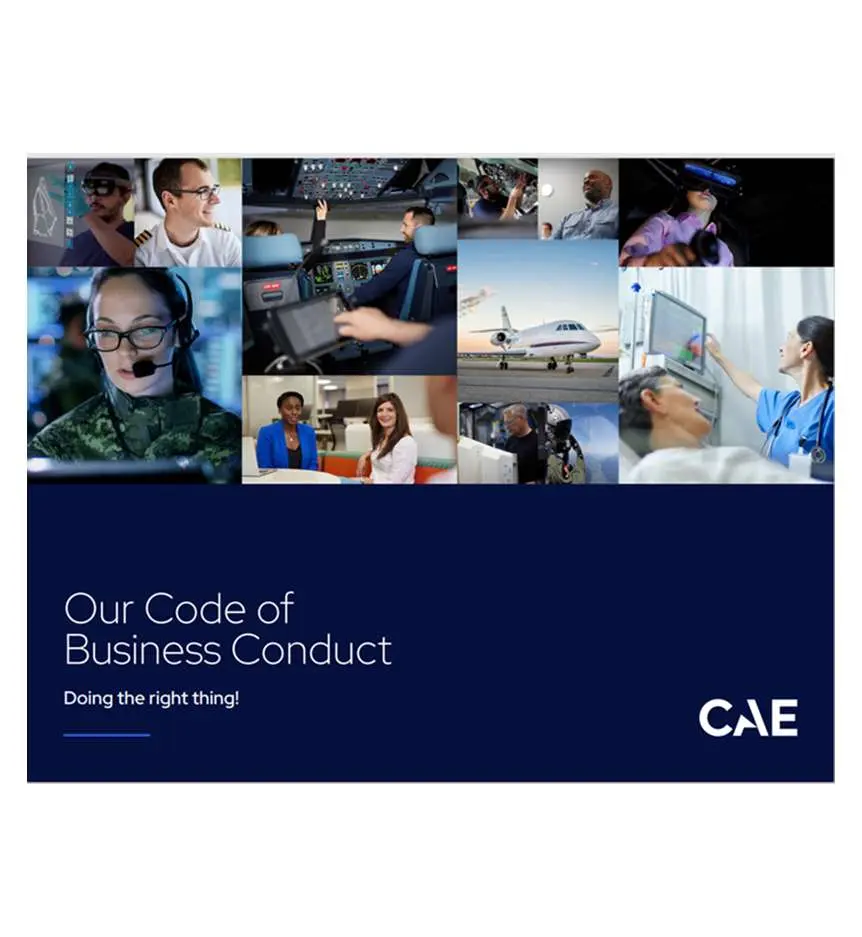



Ensure compliance and solid ethical standards.

Bribery and corruption are risks faced by virtually all organizations operating globally. Over recent years, we’ve taken several significant steps to address these risks and strengthened our compliance program.
Guided by our global Anti-Corruption Policy, we’ll continue to leverage our ongoing compliance review to reinforce our governance, risk management and internal controls. Periodic risk assessments and audits of our areas of risk help us maintain oversight on our practices and operating guidelines. Our Compliance Office works closely with the internal audit team to perform these audits. The Compliance Office also conducts risk assessments and monitoring on different programs as the need arises.
CAE has implemented several measures designed to ensure that the company does not participate in any form of corruption anywhere in the world, either directly or indirectly through a third-party such as business partners, joint venture and equity partners, acquisition targets, contractors, service providers, suppliers, vendors, distributors, and persons acting on the company’s behalf. For example:


In fiscal 2016, we launched a five-year process of enhancing our Code of Business Conduct (also available in French, Spanish, German, Portuguese) to demonstrate our commitment to address major business ethics risks. This included integrating our CSR core priorities into the Code and training our managers on the Code. As of fiscal 2018, all employees have to read, acknowledge and agree to comply with our Code on an annual basis.
To further ensure that our local and international business activities meet the highest ethical standards, we require all employees to undergo a minimum of online training on a periodic basis. For FY20, more than 98% of our employees worldwide followed the training titled “Doing the right thing!”. We also conduct face-to-face or in person awareness sessions for new employees and those who may be exposed to greater risks in the daily functions.
We also employ a third-party anonymous reporting system, EthicsPoint. This platform allows employees, customers, partners and suppliers with a simple, risk-free way to confidentially report activities that may involve criminal conduct or violations of our policies and Code of Business Conduct. Employees are strongly encouraged to report any potential misconduct so as to deter non-compliance and unethical behaviour.
CAE fully supports IFBEC's Global Principles of Business Ethics.
Human rights
As a signatory to the UN Global Compact, we demonstrate our commitment to upholding its principles, in part, by taking steps to ensure responsible procurement. We integrate human rights, labour, environment and anti-corruption considerations into our global strategic sourcing tools and processes.
Procurement documents such as Request for Proposal, Supplier Survey Report and Purchasing – General Terms and Conditions include clauses designed to specifically address compliance with laws and ethical business conduct. Employee health and safety, combatting bribery, prohibiting the use of child or forced labour, hazardous materials and conflict minerals are among the issues addressed.
Furthermore, social and environmental factors are considered alongside financial factors when making procurement decisions, and are detailed among the criteria used for supplier selection.
Conflict minerals
We established and communicated our Conflict Minerals Policy to our suppliers. Our Conflict Minerals program, which includes supply chain surveys, supports this policy. We suspended or discontinued our business relationship with some suppliers who failed to respond to or complete these surveys. We also verify smelters reported in supplier surveys to ensure their participation in the Conflict-Free Smelter Program of the Conflict-Free Sourcing Initiative (CFSI).

We became a signatory to the UN Global Compact in fiscal 2016. Since then, we’ve aligned key documents with the UN Global Compact’s Ten Principles and the United Kingdom Modern Slavery Act. We now require vendors to confirm their commitments to high ethical, environmental and social standards. In fiscal 2017, we developed a company-wide Human Rights Policy, which was be rolled out in fiscal 2018.